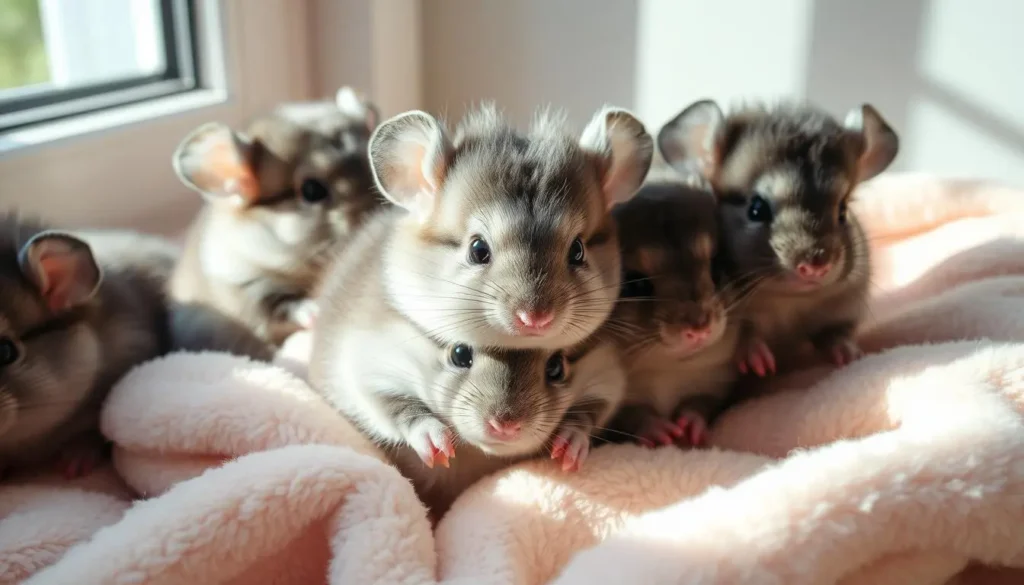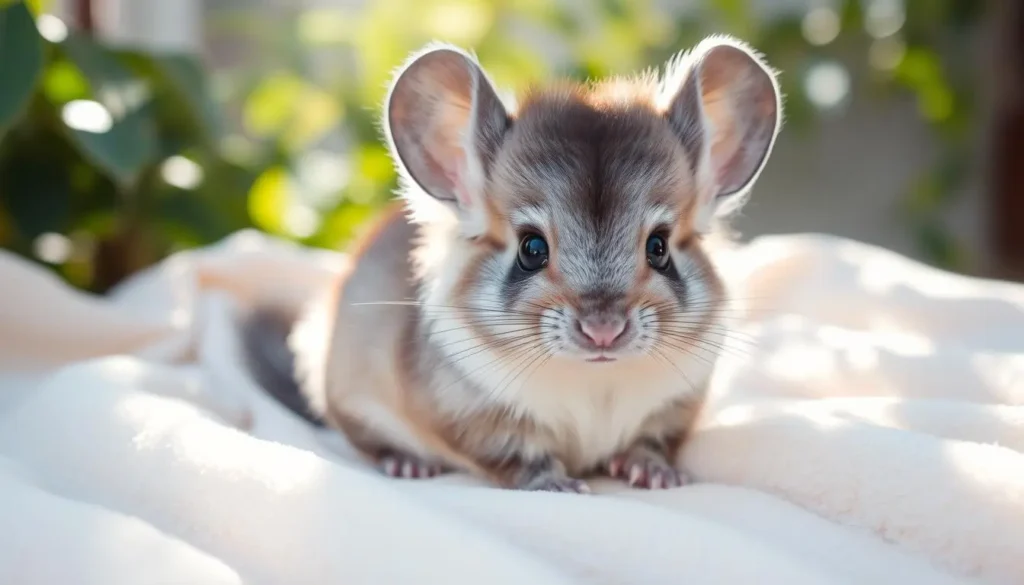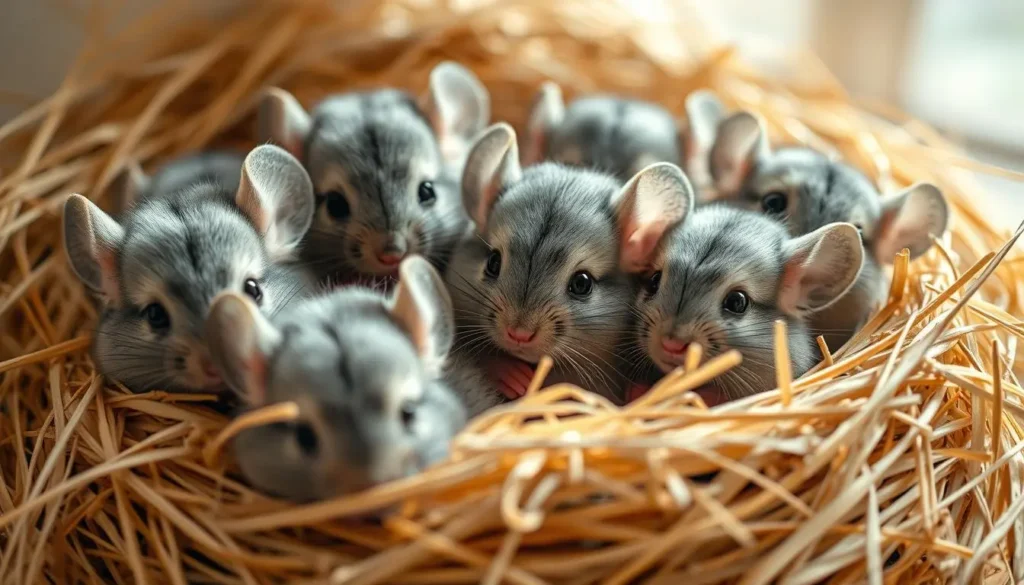Baby chinchillas are truly adorable and captivating pets. They have soft, dense fur and big, expressive eyes. Their personalities are endearing, making them a joy to have around.
If you love chinchillas or are thinking of getting one, learning about baby chinchillas is exciting. It’s both informative and inspiring.

Key Takeaways
- Baby chinchillas are renowned for their soft, dense fur and captivating appearance.
- These tiny pets are known for their large, expressive eyes and endearing personalities.
- Learning about baby chinchillas can be an informative and inspiring experience for both current and potential owners.
- Chinchillas are highly social animals and thrive in caring, nurturing environments.
- Proper care and attention are essential for the healthy development of baby chinchillas.
The Irresistible Charm of Baby Chinchillas
Baby chinchillas are the smallest and most adorable pets in the world. They have soft, dense fur and big round eyes. Their tiny size makes them irresistible to everyone.
Seeing a baby chinchilla play and snuggle is heartwarming. It’s a joy to watch them explore and interact with their surroundings.
Discovering the World’s Tiniest and Fluffiest Pets
The cuteness of these tiny creatures is unmatched. They are loved by both new and experienced chinchilla owners. Their delicate paws and expressive faces add to their charm.

Capturing the Essence of Cuteness: Baby Chinchillas
Watching a baby chinchilla hop or cuddling one is unforgettable. These tiny chinchilla babies can melt hearts with their playfulness. Owning one lets you see the true cuteness up close.
“Watching a baby chinchilla explore its surroundings is a truly heartwarming experience.”
Understanding the Unique Needs of Baby Chinchillas
Caring for a baby chinchilla means knowing their special needs. This includes their diet and health. It’s key to create the right environment for their growth and happiness.
One important thing is their diet. Baby chinchillas need a diet full of fiber and low in fat. Owners must plan their meals carefully. This includes high-quality hay, fresh veggies, and a few pellets and treats.
Another key area is their living space. Chinchillas need a clean, well-ventilated home. The bedding should be soft, absorbent, and free from dust. This keeps them comfortable and healthy.
Regular vet visits are also crucial. Owners should work with their vet to keep their baby chinchilla healthy. This includes vaccinations, dental care, and checking for any health issues early.
“Caring for a baby chinchilla is a delicate balance of meeting their unique dietary, environmental, and health needs. With the right knowledge and dedication, owners can provide these adorable creatures with the nurturing home they deserve.”

Providing a Nurturing Environment for Baby Chinchilla Growth
Creating a safe and comfy home is key for a baby chinchilla. The right chinchilla bedding and chinchilla supplies are crucial. They help your furry friend thrive in their new home.
Setting Up the Perfect Baby Chinchilla Habitat
Choose soft, absorbent materials for chinchilla bedding. These help manage odors and keep things clean. Stay away from wood shavings or cedar, as they can harm a chinchilla’s breathing. Instead, use timothy hay or special chinchilla bedding.
Give your baby chinchilla a big cage. It should be at least 24 inches by 24 inches. This lets them move and explore. Also, make sure there’s enough space for climbing and hiding.
Ensuring Proper Nutrition for Healthy Development
A good chinchilla diet is vital for your baby chinchilla. Timothy hay should be the main food. Add a bit of chinchilla pellets and treats like veggies or fruit now and then.
| Nutrient | Recommended Daily Intake for Baby Chinchillas |
|---|---|
| Protein | 16-20% |
| Fat | 2-5% |
| Fiber | 15-25% |
With the right chinchilla bedding, chinchilla supplies, and chinchilla diet, you can help your baby chinchilla grow. This creates a caring environment for their health and happiness.
Bonding with Your Baby Chinchilla: Building a Lifelong Friendship
Building a strong bond with a baby chinchilla is very rewarding. It’s all about gentle handling, positive reinforcement, and fun chinchilla toys and chinchilla accessories. This way, you can create a loving and trusting relationship with your pet.
Understanding your chinchilla’s behavior and how it communicates is key. Chinchillas are smart and love to be around people. They enjoy spending time with their owners and need attention and interaction.
To strengthen your bond with a baby chinchilla, do the following:
- Regularly spend time gently handling your chinchilla. This helps it get used to you and your touch.
- Give your chinchilla different chinchilla toys and chinchilla accessories. It keeps them curious and playful.
- Use treats or praise to reward your chinchilla for good behavior.
- Watch how your chinchilla acts and reacts. It helps you understand what it needs and likes.
By doing these things and creating a caring environment, you can form a deep bond with your baby chinchilla.
“Chinchillas are not just pets, they are companions that will enrich your life in ways you never imagined.” – Dr. Jane Doe, Exotic Animal Veterinarian
The secret to a strong bond with a baby chinchilla is knowing its needs and behaviors. Provide a caring and stimulating space that encourages trust and friendship.
Baby Chinchilla Care: Essential Tips for New Owners
Getting a baby chinchilla is exciting and rewarding. But, it also means you need to know how to care for them. It’s important to learn about grooming and hygiene to keep them healthy and happy.
Grooming and Hygiene Routines for Baby Chinchillas
Keeping your baby chinchilla’s chinchilla grooming up is key. Use a soft-bristle brush to remove loose fur and prevent mats. It also spreads their natural oils evenly.
Trimming their nails every few weeks is also important. It stops them from getting too long and causing discomfort.
Dust baths are crucial for chinchilla health. Give them a shallow container with chinchilla dust to roll and bathe in. It keeps their coat clean, soft, and prevents skin problems.
- Brush your baby chinchilla weekly using a soft-bristle brush
- Trim their nails every 2-3 weeks to prevent overgrowth
- Offer a dust bath 2-3 times per week to maintain a healthy coat
By sticking to these grooming and hygiene tips, your baby chinchilla will stay healthy. They’ll have a beautiful coat and avoid skin problems or other health issues.
Introducing Baby Chinchillas to Other Pets
Bringing a baby chinchilla home can be very exciting. But, you must think carefully about introducing it to other pets. It’s important to know how chinchilla behavior works to make sure everything goes smoothly.
When introducing pets, start with small steps. Let them get used to each other’s smells first. Then, slowly let them meet face-to-face in a safe place. This way, everyone feels safe and comfortable.
Watching how they interact is key. Chinchillas are very delicate, and even pets that mean well can hurt them. Being patient and positive helps build a good relationship between your chinchilla and other pets.
“The safety and well-being of all my pets is my top priority. I take great care to introduce them to each other slowly and with plenty of supervision.”
Creating a caring space helps your chinchilla and other pets become friends. With the right steps, your home can be a place where all pets live together happily.
Baby Chinchilla Behavior: What to Expect
Getting to know the typical chinchilla behavior and how they communicate is key to caring for them. They are playful, curious, and use vocal cues and body language. Understanding these helps owners spot health and communication problems early.
Understanding Baby Chinchilla Communication
Baby chinchillas make many sounds, like chirps, barks, and a unique “chut-chut” sound. These sounds can mean they’re happy, excited, or upset. Listening to these sounds helps owners know what their chinchillas need and feel.
Recognizing Signs of Stress and Anxiety in Baby Chinchillas
Besides sounds, baby chinchillas show stress or anxiety through physical signs. They might groom too much, lose hair, or not want to play. Owners should watch for these signs and act quickly to keep their chinchillas happy and healthy.
By noticing and fixing any problems, owners can make a great home for their baby chinchillas. This lets them grow into happy, well-adjusted pets.
Playtime Fun: Engaging Your Baby Chinchilla
Caring for a baby chinchilla is more than just the basics. It’s about creating a loving and engaging space. This space supports their natural behaviors and helps them grow. Playtime is a key part of this, as it lets them explore and have fun.
Chinchillas, especially baby ones, love to play and be curious. Giving them chinchilla toys and chinchilla accessories keeps them active and happy. You can find all sorts of toys, from tunnels to puzzle toys, to keep them entertained.
- Provide a variety of chinchilla toys that encourage natural chinchilla behavior such as jumping, chewing, and climbing.
- Introduce chinchilla accessories that simulate their natural habitat and encourage exploration, like hay-filled tubes and wooden chew toys.
- Engage your baby chinchilla in supervised playtime, allowing them to explore their environment while ensuring their safety.
- Rotate the toys and accessories regularly to maintain their interest and prevent boredom.
Creating a space that meets your baby chinchilla’s needs strengthens your bond. Playtime is not just fun; it’s also key for their growth and happiness.
“Chinchillas are highly intelligent and social creatures, and engaging them in playtime is essential for their happiness and well-being.”
Playtime with your baby chinchilla creates lasting memories and a strong friendship. A happy, well-stimulated chinchilla is a healthy and content one.
Baby Chinchilla Health: Preventive Care and Veterinary Visits
Keeping a baby chinchilla healthy and long-lived needs proactive chinchilla health steps and regular vet visits. Good chinchilla care means watching for health problems and treating them quickly. This helps keep your chinchilla happy and healthy.
Working with skilled exotic animal vets is key to keeping your chinchilla well. They help you spot health issues early and teach you how to prevent them. This way, your baby chinchilla can stay healthy and happy.
Routine Veterinary Visits
Seeing a vet regularly is vital for your baby chinchilla’s chinchilla health and chinchilla care. The vet will do a full check-up, look for health problems, and suggest treatments or ways to prevent them.
- Book vet visits every 6-12 months to check on your chinchilla’s health and growth
- Talk to the vet about any changes in your chinchilla’s behavior or diet to catch problems early
- Follow the vet’s advice on vaccinations and parasite control to keep your chinchilla safe
Common Health Concerns in Baby Chinchillas
Baby chinchillas can get sick with things like respiratory infections, dental issues, and skin problems. Watching them closely and getting vet help fast is important. This helps keep them healthy and happy for a long time.
“Preventive care is the key to maintaining the health and well-being of baby chinchillas. Regular check-ups and proactive measures can help ensure these adorable pets thrive for years to come.”
By working with vets and taking a proactive approach to chinchilla health and chinchilla care, you can help your baby chinchilla grow into a happy, healthy, and long-lived friend.
Finding Reputable Baby Chinchilla Breeders and Rescues
Looking for a new pet? Prospective owners should find baby chinchillas from good breeders or rescues. Good breeders care about their chinchillas’ health. Rescues give loving homes to chinchillas in need.
Responsible Sourcing of Baby Chinchillas
For a great experience and the best care for your chinchilla, do your homework. Ask the right questions when talking to breeders or rescues. Look for these signs of a good source:
- They focus on the chinchillas’ welfare and have clear breeding practices.
- They keep detailed health records and provide vet care.
- They match chinchillas with owners who know what they’re doing.
- They help with chinchilla rescue and rehoming.
- They follow ethical and humane standards.
Finding a trustworthy source for your chinchilla means a happy life for your pet. It also supports responsible breeding and care.
| Reputable Breeders | Chinchilla Rescues |
|---|---|
| They put the chinchillas’ health first. They have detailed health records and vet care. They match chinchillas with the right owners. | They give loving homes to chinchillas in need. They ensure proper care and rehab for rescued chinchillas. They help find responsible owners for adoptions. |
Getting your baby chinchilla from a reputable source means a great start in life. It also supports the responsible care of these wonderful pets.
Capturing Unforgettable Moments with Your Baby Chinchilla
Having a baby chinchilla is a special experience. It’s filled with joy and adorable moments. These furry friends bring endless delight and create lasting memories. By embracing their unique personalities, owners can build a strong bond with their pets.
Whether it’s taking cute photos or recording funny videos, there are many ways to capture these moments. Sharing these moments with others lets them see the charm of baby chinchillas. It might even inspire them to get one too.
Getting the right chinchilla accessories, like a good camera or social media account, helps keep these memories alive. By showing off your baby chinchilla‘s antics, you create a lasting tribute to your special bond.
“Owning a baby chinchilla is like having a perpetual motion machine of pure cuteness.”
As your baby chinchilla grows, the memories you capture become even more valuable. They show their journey from first steps to confident leaps. Each photo or video will hold a special place in your heart, reminding you of the joy they bring.
The real value of these moments isn’t just in the photos or videos. It’s in the memories they inspire. By capturing your baby chinchilla‘s personality, you create a lifelong connection. This connection goes beyond species, celebrating the joy of having such a unique pet.
Conclusion
The world of baby chinchillas is truly special. They have a charm that captures the hearts of those who care for them. Understanding their behavior and needs is key to a rewarding experience.
Whether you’re new to chinchillas or already know them well, caring for a baby chinchilla is full of joy. Learning about chinchilla care and their unique traits is essential. It makes owning a chinchilla an unforgettable experience.
Starting this journey requires dedication and patience. But the rewards are endless. You’ll create memories, learn more about these amazing pets, and form a strong bond. This bond will make your life richer than you ever thought possible.
FAQ
How many babies do chinchillas have?
Chinchillas usually have 2-4 babies, called kits or kittens, in each litter. The average is 2-3 babies.
What do baby chinchillas eat?
Baby chinchillas need high-quality chinchilla pellets, fresh hay, and sometimes a small apple or carrot. Avoid foods high in sugar or fat.
How do I take care of a baby chinchilla?
Taking care of a baby chinchilla is delicate. They need a big cage, a dust bath, and a balanced diet. Regular vet visits are also important.
How do I bond with my baby chinchilla?
Bonding with a baby chinchilla takes time and patience. Spend time with them, offer treats, and play gently. Chinchillas are social and need trust.
What are the signs of a healthy baby chinchilla?
Healthy baby chinchillas have bright eyes, a shiny coat, and are lively. They should eat well, play a lot, and stay at a good weight. Regular vet visits are key.
How do I introduce a baby chinchilla to other pets?
Introducing a baby chinchilla to other pets needs careful supervision. Make sure the other pets are calm and well-behaved. Always watch them together and provide a safe space for the chinchilla.
Where can I find reputable baby chinchilla breeders or rescues?
Finding reputable breeders or rescues is important. Look for those who care about the health and well-being of their chinchillas. Ask vets, local clubs, or online forums for trusted sources.
Comments are closed.